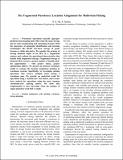| dc.contributor.author | Ho, Stephen S. | |
| dc.contributor.author | Sarma, Sanjay Emani | |
| dc.date.accessioned | 2010-10-18T12:05:00Z | |
| dc.date.available | 2010-10-18T12:05:00Z | |
| dc.date.issued | 2009-09 | |
| dc.date.submitted | 2009-09 | |
| dc.identifier.isbn | 978-1-4244-3958-4 | |
| dc.identifier.other | INSPEC Accession Number: 10892981 | |
| dc.identifier.uri | http://hdl.handle.net/1721.1/59389 | |
| dc.description.abstract | Warehouse operations typically aggregate identical stock keeping units (SKU) into the same storage bin for easier bookkeeping and organizing of goods. With the emergence of automatic identification and tracking technologies like RFID, free-form storage of goods becomes a viable alternative. We consider the strategy of storing identical copies of an SKU in a fragmented manner and evaluate the operational characteristics that benefit from fragmented storage. Fragmented storage of identical SKUs creates a greater number of feasible picklist opportunities - with greater choice, greater optimization follows. We present an abstract warehouse model to evaluate the location assignment problem in warehouse systems. Specifically, we investigate picking operations that retrieve multiple items during a warehouse pass. We provide an analytical result for operations using a 'hybrid-cost' cost metric, and a brute force analysis for operations using the more common 'maximum-cost' picking metric. We show that fragmentation is more favorable when the number of copies picked for each SKU is small. | en_US |
| dc.language.iso | en_US | |
| dc.publisher | Institute of Electrical and Electronics Engineers | en_US |
| dc.relation.isversionof | http://dx.doi.org/10.1109/LINDI.2009.5258752 | en_US |
| dc.rights | Article is made available in accordance with the publisher's policy and may be subject to US copyright law. Please refer to the publisher's site for terms of use. | en_US |
| dc.source | IEEE | en_US |
| dc.subject | warehouse storage planning | en_US |
| dc.subject | order picking | en_US |
| dc.subject | location assignment | en_US |
| dc.title | The fragmented warehouse: Location assignment for multi-item picking | en_US |
| dc.type | Article | en_US |
| dc.identifier.citation | Ho, S.S., and S. Sarma. “The Fragmented Warehouse: Location Assignment for Multi-Item Picking.” Logistics and Industrial Informatics, 2009. LINDI 2009. 2nd International. 2009. 1-6. © Copyright 2010 IEEE | en_US |
| dc.contributor.department | Massachusetts Institute of Technology. Department of Mechanical Engineering | en_US |
| dc.contributor.approver | Ho, Stephen S. | |
| dc.contributor.mitauthor | Ho, Stephen S. | |
| dc.contributor.mitauthor | Sarma, Sanjay Emani | |
| dc.relation.journal | 2nd International Logistics and Industrial Informatics, 2009. LINDI 2009. | en_US |
| dc.eprint.version | Final published version | en_US |
| dc.type.uri | http://purl.org/eprint/type/JournalArticle | en_US |
| eprint.status | http://purl.org/eprint/status/PeerReviewed | en_US |
| dspace.orderedauthors | Ho, S. S.; Sarma, S. | en |
| dc.identifier.orcid | https://orcid.org/0000-0003-2812-039X | |
| mit.license | PUBLISHER_POLICY | en_US |
| mit.metadata.status | Complete | |
